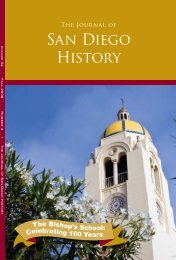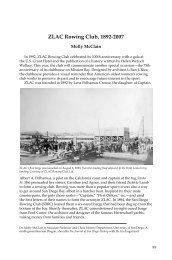You also want an ePaper? Increase the reach of your titles
YUMPU automatically turns print PDFs into web optimized ePapers that Google loves.
The Journal of <strong>San</strong> <strong>Diego</strong> <strong>History</strong><br />
Ellen Browning Scripps, ca. 1891. Courtesy of Ella Strong<br />
Denison Library, Scripps College.<br />
Ellen was not particularly concerned<br />
about the poor—in fact, she<br />
had a horror of beggars—but she<br />
disapproved of monopolists and the<br />
accumulation of vast wealth. She<br />
once asked E.W. why he did not consider<br />
separating his business interests<br />
from those of their brother James: “It<br />
may seem a pity to your ambitions<br />
to check in its mid-career a business<br />
which promises magnificent growth<br />
and results. But, after all, what is it<br />
we are doing but amassing money<br />
and becoming monopolists? I see<br />
that Carnegie in the North American<br />
is discussing the duties of a monied<br />
man. He has amassed $20,000,000.<br />
The question of benefitting mankind<br />
should have been considered and<br />
solved at a time and in a way that<br />
should have prevented his becoming<br />
a millionaire.” 10<br />
At the same time, Ellen shared<br />
E.W.’s belief that philanthropy should not lead to dependency but should go<br />
towards organizations and institutions that aimed to improve society. She understood<br />
all too well the emotional dynamics created by wealth and poverty within a<br />
family—and by extension the human family—and believed that money could and<br />
should help people take steps towards self-sufficiency. On occasion, family tensions<br />
caused her to imagine escaping to a distant desert island, “where the air that<br />
I breathe will not be tainted, nor my ears polluted with the foul smell and sound of<br />
money, and the baseness of spirit it engenders.” She thought that only one member<br />
of the family, her older sister Elizabeth, remained “uncontaminated by the vile<br />
thing” and, as a result, preserved her “independence and moral tone.” 11<br />
California offered both Ellen and E.W. a chance to escape, albeit briefly, from<br />
the business of making money. They had considered a trip as early as 1885—“We<br />
ought to cross the country some time,” the latter wrote. 12 Instead, they decided to<br />
travel through Mexico with James and his family in 1885-86. They visited cities on<br />
Mexico’s Pacific Coast and, once back in the United States, traveled as far west as<br />
Albuquerque and Las Vegas. It was not until their sister Annie headed to California<br />
that the Scripps family found an excuse to leave for the Golden State.<br />
Annie Scripps went to California in 1887 in search of a remedy—both spiritual<br />
and physical—for crippling rheumatoid arthritis. She found a home at the Remedial<br />
Institute and School of Philosophy, also known as the New Order of Life, in<br />
Alameda. 13 One of many utopian communities founded in late nineteenth-century<br />
California, it offered “a life of brotherly love” guided by the pseudo-scientific<br />
principles of its founder, Dr. Horace Bowen. 14 Annie spoke highly of her experience,<br />
writing to her brother that the “principles that have been inculcated in my<br />
soul’s consciousness” had blessed her. “You are a businessman,” she wrote, “and,<br />
4


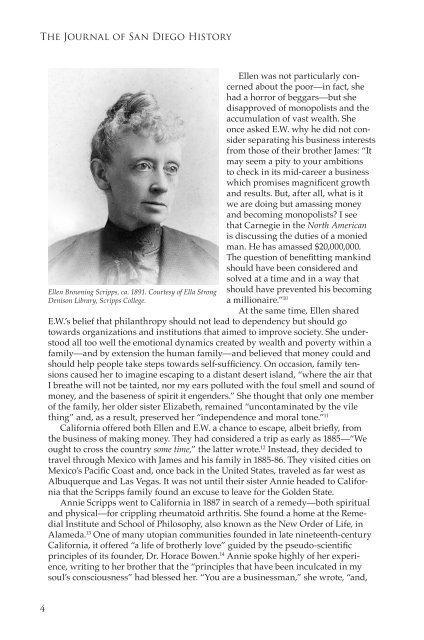
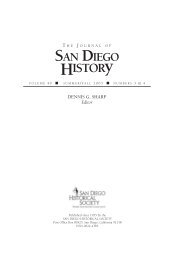

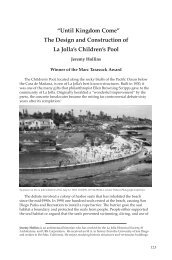
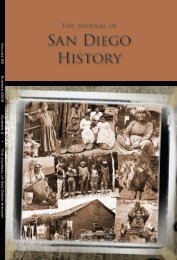
![[PDF] The Journal of San Diego History Vol 52: Nos 1 & 2](https://img.yumpu.com/25984149/1/172x260/pdf-the-journal-of-san-diego-history-vol-52-nos-1-2.jpg?quality=85)
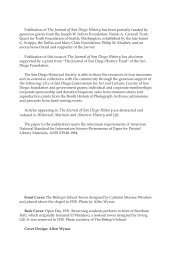
![[PDF] The Journal of San Diego History - San Diego History Center](https://img.yumpu.com/25984131/1/172x260/pdf-the-journal-of-san-diego-history-san-diego-history-center.jpg?quality=85)
